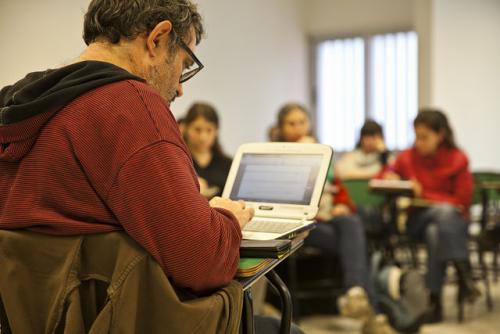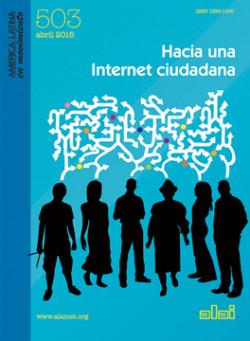So open, so closed
- Análisis

| Article published in ALAI’s magazine No. 503: Hacia una Internet ciudadana 28/04/2015 |
Since the popularization of digital media, many words have been incorporated into activist and political discourse: free, open, sharing, transparency, network, among others. Some of these words seem to be part of a progressive language and have been promoted as such, yet these terms can easily transit between different political discourses.
In what seems to be a turnabout in capitalism, digital companies start to gain ground from the usual big businesses like banks, oil and mining. Last December, Apple reported the highest trimestral income a company has ever made. In 2013, WhatsApp, a company with about 50 employees and a relatively small infrastructure, was bought for 19 billion dollars (12 of which were paid in shares). Mark Zuckerberg (Facebook co-founder) not only paid for the company's name and established market, but also for the information of its 400 million users – or we might say he paid for its users – and thus, for the elimination of competition. There are many other examples of this kind of acquisition and fusion; many start-ups are designed to be bought up by big corporations. This new face of capitalism reveals a tendency of the digital and cognitive economy towards forming monopolies. And let’s not forget that when we speak of intellectual property, we speak of legal monopolies over knowledge, wisdom, and cultural products.
In the stock market, companies depend on an abstract and speculative value of their brand – intellectual property. This value depends on the company's infrastructure and reputation (size, efficiency, market, symbolic capital), but now more than ever, it is also related to ownership and monopoly over knowledge and information. The gathering, classification and new systems of massive data analysis are the trend, as well as the concentration of patents. The digital economy has been based on the commercial transaction of generated, collected and appropriated information and innovation. Many of these transactions are ruled by global intellectual property norms: patents, brands and copyright. Nevertheless, the information we produce while navigating the Internet and part of the contents we voluntarily leave on different apps are not protected by any author right. They are subjected to the terms and conditions of each system. In other words, if you decide to use certain software, you are obligated to accept all the imposed conditions (even to sell your immortal soul, as a British video game ironically included in its terms of use).
Terms in dispute
In the global intellectual property system there has been a tendency towards increased protection of ownership rights, and for longer periods: mainly commercial rights, rather than those of the author. Nevertheless, the rights over content and data left by users on the web have been completely left out of copyright norms. Europe has established some initial regulation concerning user information on the Internet. For example, the requirement of user consent to be able to sell their information, though the option is still included in the terms and conditions you have to accept to access an app. The right to be forgotten has also been established: a controversial law, because those who apply for it the most are people with criminal records. There is a legitimate right to remake one’s life, yet, some social groups consider certain crimes and high corruption acts should not be forgotten. Of course, for those who can afford it, there are companies specialized in deleting digital footprints, beyond regulation.
After Snowden's NSA (US) and GCHQ (UK) mass surveillance revelations, privacy and security have been positioned as the core terms in public opinion to approach the notion of digital rights. To this, the cognitive economy asks: if we offer you better security, are you willing to pay for services that used to be free? So even before being fully established, digital rights are starting to be understood as a commodity. Yet, beyond the crucial importance of privacy, data confidentiality and public reputation, we can also ask ourselves whether we don’t deserve the right to consent to the commercialization of our information, transcending the all-or-nothing app terms logic. And if we consent to sell, do we have a right to a benefit? In the “free app” logic, we get a service in exchange for our information; that is the price of the 'free'. Nevertheless, considering the extraordinary growth of a few companies and the potential of the information they are gathering, we can well wonder, as a society, if this is a fair exchange.
In 1950, the anthropologist Marcel Mauss, based on the study of ancestral economies, established his notion of Gift Economy, in which giving or accepting a gift, beyond solidarity, was constitutive of an exercise of power and interest, that defined the relationship between giver and taker. On the basis of Marxist theory, Tristana Terranova uses this notion to approach what she denominates free labor: a new form of labor exploitation in the digital realm, in which our interactions can become a commodity; even the volunteer work for the public good can directly or indirectly end up supporting big IT companies. Some of these big companies collaborate with the development of free and open software projects by giving funding or allowing their programmers flexible work schedules. If Linux-Ubuntu is one of the most widely used operating systems in the world, it is partly because Google and its important percentage of computers run with Goobuntu, its own personalized version.
It is difficult to ideologically oppose free and open to restricted and proprietary, marking a clear difference between left and right. Digital terms have become terms in dispute. Without a doubt, Free Software has detonated new productive organization dynamics, new business models, self-taught attitudes, and generated activist communities and even political parties like the Pirate Party. But free is also related to a liberal ideology of de-regularization. On the other hand, Open Software, while maintaining an open source spirit, acquired a more pragmatic and flexible attitude towards the market. For Nathaniel Tkacz[1], open is based on the same values of neoliberal democracies: liberty, individuality, competition and exchange. Openness hides its closures; as a software collaborator you can only access the code if you have the knowledge and the tools to do so, you can only choose between certain jobs, you cannot change the labor distribution or the business model. With transparency, something similar happens; it can be a synonymous of honesty but it also has the connotation of permanent surveillance and self-discipline through the other's gaze. Even the notion of sharing economy has become the symbolic capital of a few –millionaire – Silicon Valley companies, such as Uber.
Forms of property
Digital media is very seductive; it offers games, information, plasticity and comfort for building virtual identities, and new forms of relating and communicating. Our participation supports its economy; this is why we are constantly asked: tell us about your life, do you like this or that, let’s time your run, create a network, invite friends. Faced with this saturation, we could do well to recall the value of saying nothing, that Deleuze advised: repressive forces do not stop people from expressing themselves, on the contrary, they force us to express ourselves continuously.
The idea that the potential of social participation through the Internet would end up strengthening capitalism may seem rather disappointing. Nonetheless, we should not underestimate what these mechanisms have achieved: new forms of social organization through work in solidarity, common knowledge and interests, communities not defined by geography or conditioned by commercial outcomes. As Martin Petersen[2] argues, Free Software's main contribution has been the possibility to think in terms of different forms of property: Copyleft established a form of property that remains in the public domain and Creative Commons (CC) offers diverse distribution options for creative practices, without hindering their commercialization. Yet, beyond these examples, property can be defined in many other ways through new licenses. CC and Copyleft fall short in being able to generate licenses which are communitarian, associative, national, regional, suited for ancestral knowledge, or specific to music or film. The way we define our creative properties will directly influence our business models and work associations, as software has shown us.
To think about new license models, new forms of non-monopolistic property, will not only create alternatives to the actual global system of intellectual property – foundational to neoliberalism –, but can also propose changes to the State. The Capitalist State was defined by its role in the defense and protection of private property; by changing the conception of property, this “immaterial” property driving the new economy, and by making the State assume responsibilities over new possible forms of property – public, communitarian, associative – it may be possible to alter the logic of the State itself.
Pedro Cagigal is at present a researcher in science and technology processes in Latin America, with FEDAEPS, Quito. He has a master’s degree in Culture and Digital Society.
Article published in: Latin America in Movement 503, ALAI, April 2015. “Towards a people’s Internet” http://www.alainet.org/en/revistas/169787
[1] Tkacz, N. (2012). From open source to open government: A critique of open politics. Ephemera, 12(4), 386.
[2] Pedersen, M. (2010). Free culture in context: Property and the politics of free software. The commoner, (14), 40-136.
Del mismo autor
- Trump: the comedy and terror of political incorrectness 01/02/2017
- Trump: la comedia y el terror de lo políticamente incorrecto 27/01/2017
- So open, so closed 21/05/2015
- Tan abierto, tan cerrado 12/05/2015
Artículos relacionados
Clasificado en
Clasificado en:
Internet ciudadana
- Nick Bernards 31/03/2022
- Paola Ricaurte 10/03/2022
- Burcu Kilic 03/03/2022
- Shreeja Sen 25/02/2022
- Internet Ciudadana 16/02/2022

